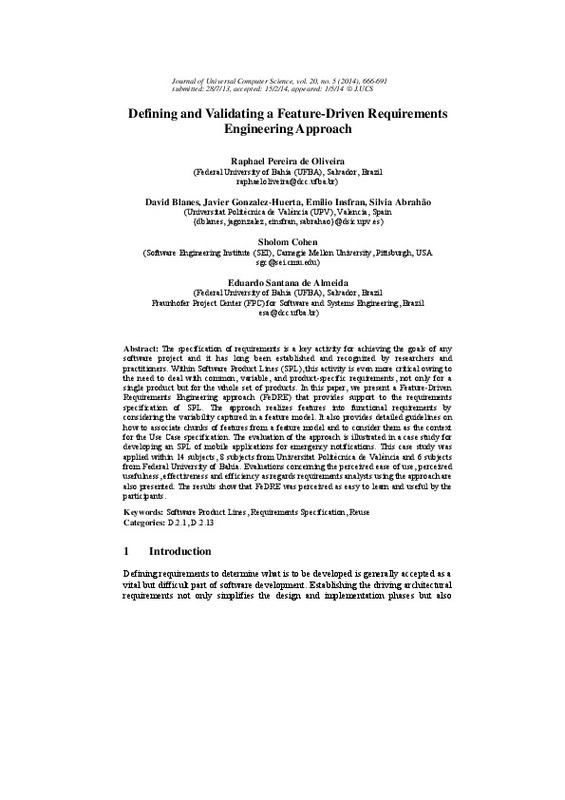JavaScript is disabled for your browser. Some features of this site may not work without it.
Buscar en RiuNet
Listar
Mi cuenta
Estadísticas
Ayuda RiuNet
Admin. UPV
Defining and validating a feature-driven requirements engineering approach
Mostrar el registro sencillo del ítem
Ficheros en el ítem
| dc.contributor.author | de Oliveira, Raphael Pereira
|
es_ES |
| dc.contributor.author | Blanes Domínguez, David
|
es_ES |
| dc.contributor.author | González Huerta, Javier
|
es_ES |
| dc.contributor.author | Insfrán Pelozo, César Emilio
|
es_ES |
| dc.contributor.author | Abrahao Gonzales, Silvia Mara
|
es_ES |
| dc.contributor.author | Cohen, Sholom
|
es_ES |
| dc.contributor.author | de Almeida, Eduardo Santana
|
es_ES |
| dc.date.accessioned | 2015-02-24T10:49:21Z | |
| dc.date.available | 2015-02-24T10:49:21Z | |
| dc.date.issued | 2014 | |
| dc.identifier.issn | 0948-6968 | |
| dc.identifier.uri | http://hdl.handle.net/10251/47421 | |
| dc.description.abstract | [EN] The specification of requirements is a key activity for achieving the goals of any software project and it has long been established and recognized by researchers and practitioners. Within Software Product Lines (SPL), this activity is even more critical owing to the need to deal with common, variable, and product-specific requirements, not only for a single product but for the whole set of products. In this paper, we present a Feature-Driven Requirements Engineering approach (FeDRE) that provides support to the requirements specification of SPL. The approach realizes features into functional requirements by considering the variability captured in a feature model. It also provides detailed guidelines on how to associate chunks of features from a feature model and to consider them as the context for the Use Case specification. The evaluation of the approach is illustrated in a case study for developing an SPL of mobile applications for emergency notifications. This case study was applied within 14 subjects, 8 subjects from Universitat Politècnica de València and 6 subjects from Federal University of Bahia. Evaluations concerning the perceived ease of use, perceived usefulness, effectiveness and efficiency as regards requirements analysts using the approach are also presented. The results show that FeDRE was perceived as easy to learn and useful by the participants. | es_ES |
| dc.description.sponsorship | This research work is cofounded by the Hispano-Brazilian Interuniversity Cooperation Program (HBP-2011-0015), the MULTIPLE project (TIN2009-13838) and the FPU program (AP2009-4635) from the Spanish Ministry of Education and Science, and the ValI+D program (ACIF/2011/235) Generalitat Valenciana. Copyright 2014 Carnegie Mellon University. This material is based upon work funded and supported by the Department of Defense under Contract No. FA8721-05-C-0003 with Carnegie Mellon University for the operation of the Software Engineering Institute, a federally funded research and development center. NO WARRANTY. THIS CARNEGIE MELLON UNIVERSITY AND SOFTWARE ENGINEERING INSTITUTE MATERIAL IS FURNISHED ON AN “AS-IS” BASIS. CARNEGIE MELLON UNIVERSITY MAKES NO WARRANTIES OF ANY KIND, EITHER EXPRESSED OR IMPLIED, AS TO ANY MATTER INCLUDING, BUT NOT LIMITED TO, WARRANTY OF FITNESS FOR PURPOSE OR MERCHANTABILITY, EXCLUSIVITY, OR RESULTS OBTAINED FROM USE OF THE MATERIAL. CARNEGIE MELLON UNIVERSITY DOES NOT MAKE ANY WARRANTY OF ANY KIND WITH RESPECT TO FREEDOM FROM PATENT, TRADEMARK, OR COPYRIGHT INFRINGEMENT. This material has been approved for public release and unlimited distribution. Carnegie Mellon® is registered in the U.S. Patent and Trademark Office by Carnegie Mellon University. DM-0000867. This work was partially supported by the National Institute of Science and Technology for Software Engineering (INES11), funded by CAPES, CNPq and FACEPE, grants 573964/2008-4 and APQ-1037-1.03/08 and CNPq grants 305968/2010-6, 559997/2010-8, 474766/2010-1 and FAPESB. The authors also appreciate the value-adding work of all their colleagues Loreno Alvim, Larissa Rocha, Ivonei Freitas, Tassio Vale and Iuri Santos who make great contributions to the Scoping activity of FeDRE approach. | |
| dc.language | Inglés | es_ES |
| dc.publisher | Graz University of Technology, Institut für Informationssysteme und Computer Medien (IICM) | es_ES |
| dc.relation.ispartof | Journal of Universal Computer Science | es_ES |
| dc.rights | Reserva de todos los derechos | es_ES |
| dc.subject | Requirements specification | es_ES |
| dc.subject | Software product lines | es_ES |
| dc.subject | Reuse | es_ES |
| dc.subject.classification | CIENCIAS DE LA COMPUTACION E INTELIGENCIA ARTIFICIAL | es_ES |
| dc.subject.classification | LENGUAJES Y SISTEMAS INFORMATICOS | es_ES |
| dc.title | Defining and validating a feature-driven requirements engineering approach | es_ES |
| dc.type | Artículo | es_ES |
| dc.identifier.doi | 10.3217/jucs-020-05-0666 | |
| dc.relation.projectID | info:eu-repo/grantAgreement/HBP//HBP-2011-0015/ | es_ES |
| dc.relation.projectID | info:eu-repo/grantAgreement/MICINN//TIN2009-13838/ES/Multimodeling Approach For Quality-Aware Software Product Lines/ | es_ES |
| dc.relation.projectID | info:eu-repo/grantAgreement/ME//AP2009-4635/ES/AP2009-4635/ | es_ES |
| dc.relation.projectID | info:eu-repo/grantAgreement/GVA//ACIF%2F2011%2F235/ | es_ES |
| dc.relation.projectID | info:eu-repo/grantAgreement/DOD//FA8721-05-C-0003/ | es_ES |
| dc.relation.projectID | info:eu-repo/grantAgreement/CNPq//559997%2F2010-8/ | es_ES |
| dc.relation.projectID | info:eu-repo/grantAgreement/CNPq//305968%2F2010-6/ | es_ES |
| dc.relation.projectID | info:eu-repo/grantAgreement/CNPq//573964%2F2008-4/ | es_ES |
| dc.relation.projectID | info:eu-repo/grantAgreement/CNPq//APQ-1037-1.03%2F08/ | es_ES |
| dc.relation.projectID | info:eu-repo/grantAgreement/CNPq//474766%2F2010-1/ | |
| dc.rights.accessRights | Abierto | es_ES |
| dc.contributor.affiliation | Universitat Politècnica de València. Departamento de Sistemas Informáticos y Computación - Departament de Sistemes Informàtics i Computació | es_ES |
| dc.description.bibliographicCitation | De Oliveira, RP.; Blanes Domínguez, D.; González Huerta, J.; Insfrán Pelozo, CE.; Abrahao Gonzales, SM.; Cohen, S.; De Almeida, ES. (2014). Defining and validating a feature-driven requirements engineering approach. Journal of Universal Computer Science. 20(5):666-691. https://doi.org/10.3217/jucs-020-05-0666 | es_ES |
| dc.description.accrualMethod | S | es_ES |
| dc.relation.publisherversion | http://doi.org/10.3217/jucs-020-05-0666 | es_ES |
| dc.description.upvformatpinicio | 666 | es_ES |
| dc.description.upvformatpfin | 691 | es_ES |
| dc.type.version | info:eu-repo/semantics/publishedVersion | es_ES |
| dc.description.volume | 20 | es_ES |
| dc.description.issue | 5 | es_ES |
| dc.relation.senia | 278956 | |
| dc.contributor.funder | Hispano-Brazilian Interuniversity Cooperation Program | |
| dc.contributor.funder | Generalitat Valenciana | |
| dc.contributor.funder | U.S. Department of Defense | |
| dc.contributor.funder | Conselho Nacional de Desenvolvimento Científico e Tecnológico, Brasil | |
| dc.contributor.funder | Ministerio de Ciencia e Innovación | es_ES |
| dc.contributor.funder | Ministerio de Educación | es_ES |








